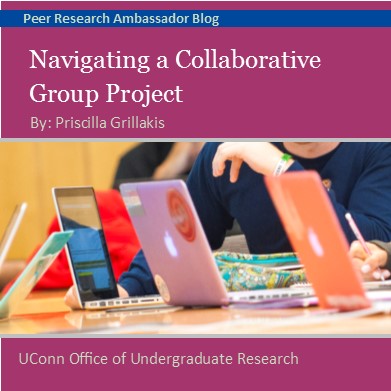By: Priscilla Grillakis, OUR Peer Research Ambassador
Getting involved in research was something I had always wanted to do, but was unsure of how to do. In December of my sophomore year, one of my friends from Neag School of Education was approached by two of her Neag classmates to join their research project and apply for an IDEA grant. She mentioned to them that she thought I would be an asset to the project because she thought my Speech, Language, and Hearing Sciences major and Spanish minor provided me with a skill set that would complement their educational skill set. I gladly agreed to join their team, and we applied for an IDEA grant that following spring.
While being on an interdisciplinary research team can seem intimidating at first, I would highly recommend it. Being on a team can bring about some challenges, so consider these tips!
Designate individual responsibilities
Our project aims to construct a bilingual peer-to-peer tutoring program for Emergent Bilingual students to improve upon their language skills. My focus in the project is monitoring the language acquisition of the students in the program, while my group is focusing on the various educational aspects going into the program.
Create and maintain a shared vision
Our project has a heavy social service component. My group and I are passionate about creating a successful program because we believe it will help these students immensely. Being on an interdisciplinary research team can be difficult because at times we will disagree on various things, like when we each feel there should be a heavier emphasis on our individual components, but thinking about the purpose of our research project has helped to ground us.
Be open to new ideas and perspectives
At first, I was nervous about being the only team member from a different major, but after our first group meeting it was evident how valuable this diversity was, and that our group was open to hearing and researching all new ideas. Having different backgrounds allows us to see the same problems and ideas from different perspectives, providing us with a variety of problem solving options. There are times when I mention ideas about topics regarding the project that my team members are unfamiliar with, and vice versa. I have found that it has made our project well rounded because we have information from different fields contributing to the topic. If I had researched this topic on my own, I would have done so through my SLHS lens. Having people with different perspectives has taught me to look at problems through all sorts of different angles, and that providing answers through various perspectives leads to a stronger final result.
Priscilla Grillakis is a junior majoring in Speech, Language and Hearing Sciences and minoring in Spanish. Click here to learn more about Priscilla.